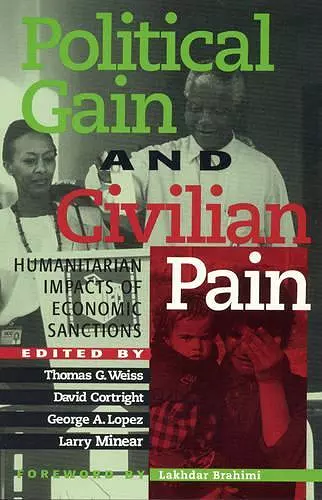Political Gain and Civilian Pain
Humanitarian Impacts of Economic Sanctions
David Cortright editor Thomas G Weiss editor George A Lopez editor Larry Minear editor
Format:Hardback
Publisher:Rowman & Littlefield
Published:11th Dec '97
Currently unavailable, our supplier has not provided us a restock date

The use of sanctions is increasing in the post-Cold War world. Along with this increase, the international community must ask itself whether sanctions 'work,' in the sense that they incite citizens to change or overthrow an offending government, and whether sanctions are really less damaging than the alternative of war. Here for the first time, sanctions and humanitarian aid experts converge on these questions and consider the humanitarian impacts of sanctions along with their potential political benefits. The results show that often the most vulnerable members of targeted societies pay the price of sanctions, and that in addition, the international system is called upon to compensate the victims for the undeniable pain they have suffered. Well-chosen case studies of South Africa, Iraq, the former Yugoslavia, and Haiti illustrate how much pain the community of states is willing to inflict upon civilians in the quest for political gains. Together with an analytical framework and policy conclusions, this important book seeks to clarify the range of options and strategies to policymakers who impose sanctions and to humanitarian officials who operate in sanctioned environments.
Political Gain and Civilian Pain does provide a useful review of the issues and complexities faced in dealing with this issue. It covers the arguments in a thorough fashion, and, importantly, ensures that the pain versus gain debate remains on the agenda. -- David Westeood, Policy and Research Dept. World Vision UK * Development in Practice, Vol. 8, N0. 3, Aug.98 *
In UNICEF's experience, economic sanctions are blunt instruments that often have a disproportionate impact on the most vulnerable members of society—children. This book explores the consequences of sanctions from various perspectives in four diverse situations. The international community can learn from these experiences that the potential impact on the most vulnerable groups must be carefully appraised before political decisions are imposed. -- Carol Bellamy, executive director of UNICEF
Combining the insights and proven research experience of specialists both in international humanitarian assistance and economic sanctions . . . Weiss et al. perform a very valuable service in addressing important and neglected issues, in the scholarly way that their previlus contributions to the literature lead us to expect. -- Peter Burnell, University of Warwick * Political Studies Review, Sept. '99; Vol. 47 No. 4 *
The preoccupations and views of all those concerned by economic sanctions are accurately and fairly reflected in the pages of this volume. Field workers from various UN agencies and NGOs will be particularly grateful, I believe, for the genuine sympathy and understanding shown by the editors and the authors of case studies when they describe the frustrations and numerous problems with sanctions as their 'bite' increases along with the humanitarian needs of civilians in targeted countries. . . . When economic sanctions are agreed, they should be accompanied by the careful calculations and humanitarian safeguards that the editors recommend. Political Gain and Civilian Pain breaks new ground for applied scholarship. I commend it to diplomats, UN and NGO officials, and academics alike. It is a 'must' for anyone active in this field. -- Lakhdar Brahimi, Under Secretary General for the Secretary General's Preventive Peacemaking Efforts, From the Foreword DIS .40
ISBN: 9780847687022
Dimensions: 235mm x 159mm x 22mm
Weight: 562g
256 pages